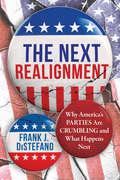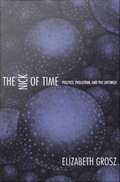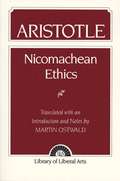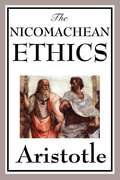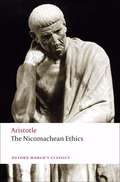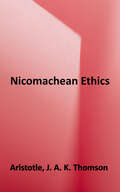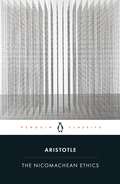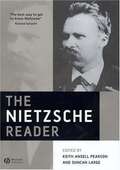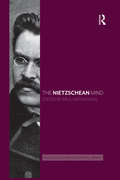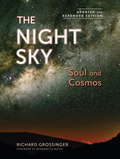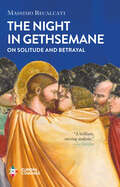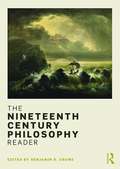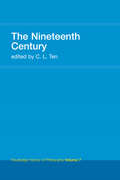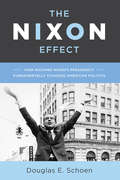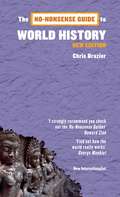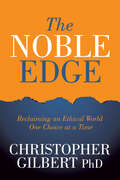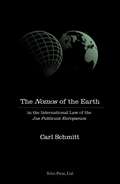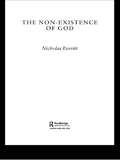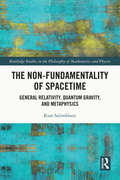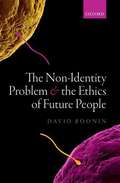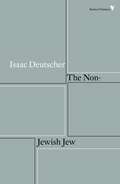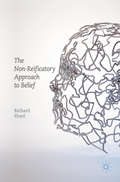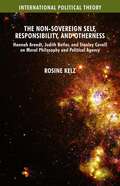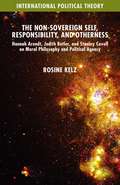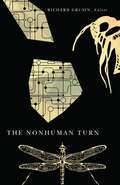- Table View
- List View
The Next Realignment: Why America's Parties Are Crumbling and What Happens Next
by Frank J. DiStefanoAn astute analysis of today's political chaos showing that the current period of disruptive change is part of a recurring pattern in American politics.What's happening to American politics? Old political norms seem to be slipping away. Politics has progressively become angrier, new movements keep butting into the public square, and more and more of the unwritten rules that governed American politics for decades have fallen away. Naturally, many are anxious.Former congressional aide and presidential campaign veteran Frank J. DiStefano argues that this political turmoil feels disquietingly new only because most of us know so little about the history of American politics. In this book, he puts the present era in historical context, showing that America is facing its next realignment, a period of destruction and rebirth in which old political coalitions decay and new parties rise to replace them. DiStefano explains how the history of past realignments connects to contemporary politics. He examines clashes between Hamilton's Federalists and Jefferson's Democratic-Republicans, the rise of Andrew Jackson, the traumatic collapse of the Whigs, the populist revolt of William Jennings Bryan, and the formation of our New Deal party system of today. He explores America's periodic explosions of moral crusading called great awakenings. He clarifies the real ideas and philosophical forces that make up our politics, from liberty and virtue to populism and progressivism, showing how their interaction is now remaking our parties into something new. Will this realignment be a quick renewal as we adapt our politics for a future with new problems, or do we face years of disruption, dangerous movements, and chaotic politics before we rebuild? This book shows that, with a knowledge of history, all of us can help shape the politics of the coming decades and restore our trust in the American Dream.
The Nick of Time: Politics, Evolution, and the Untimely
by Elizabeth GroszIn this pathbreaking philosophical work, Elizabeth Grosz points the way toward a theory of becoming to replace the prevailing ontologies of being in social, political, and biological discourse. Arguing that theories of temporality have significant and underappreciated relevance to the social dimensions of science and the political dimensions of struggle, Grosz engages key theoretical concerns related to the reality of time. She explores the effect of time on the organization of matter and on the emergence and development of biological life. Considering how the relentless forward movement of time might be conceived in political and social terms, she begins to formulate a model of time that incorporates the future and its capacity to supersede and transform the past and present. Grosz develops her argument by juxtaposing the work of three major figures in Western thought: Charles Darwin, Friedrich Nietzsche, and Henri Bergson. She reveals that in theorizing time as an active, positive phenomenon with its own characteristics and specific effects, each of these thinkers had a profound effect on contemporary understandings of the body in relation to time. She shows how their allied concepts of life, evolution, and becoming are manifest in the work of Gilles Deleuze and Luce Irigaray. Throughout The Nick of Time, Grosz emphasizes the political and cultural imperative to fundamentally rethink time: the more clearly we understand our temporal location as beings straddling the past and the future without the security of a stable and abiding present, the more transformation becomes conceivable.
The Nicomachean Ethics
by AristotleEnduringly profound treatise, whose lasting effect on Western philosophy continues to resonate. Aristotle identifies the goal of life as happiness and discusses its attainment through the contemplation of philosophic truth. Translated, with notes and introduction by Martin Ostwald.
The Nicomachean Ethics
by AristotleNicomachean Ethics focuses on the importance of habitually behaving virtuously and developing a virtuous character. Aristotle emphasized the importance of context to ethical behavior, and the ability of the virtuous person to recognize the best course of action. Aristotle argued that happiness and well being is the goal of life, and that a person's pursuit of such, rightly conceived, will result in virtuous conduct. "EVERY art and every inquiry, and similarly every action and pursuit, is thought to aim at some good; and for this reason the good has rightly been declared to be that at which all things aim." -Aristotle
The Nicomachean Ethics
by AristotleThe Author examines the nature of happiness, which he defines as a specially good kind of life. He considers the nature of practical reasoning, friendship, and the role and importance of the moral virtues in the best life.
The Nicomachean Ethics
by AristotleA profound examination of the nature of happiness by one of the giants of ancient Greek philosophy In The Nicomachean Ethics, Aristotle argues that happiness consists in 'activity of the soul in accordance with virtue' - for example, with moral virtues, such as courage, generosity and justice, and intellectual virtues, such as knowledge, wisdom and insight. The Ethics also discusses the nature of practical reasoning, the value and the objects of pleasure, the different forms of friendship and the relationship between individual virtue, society and the State. Aristotle's work has had a lasting influence on all subsequent Western thought about ethical matters.
The Nicomachean Ethics
by AristotleOne of the most important philosophical works of all time, in a new Penguin Classics translation by Adam Beresford'Right and wrong is a human thing' What does it mean to be a good person? Aristotle's famous series of lectures on ethical topics ranges over fundamental questions about good and bad character; pleasure and self-control; moral wisdom and the foundations of right and wrong; friendship and love in all their forms - all set against a rich and humane conception of what makes for a flourishing life. Adam Beresford's freshly researched translation presents many of Aristotle's key terms and idioms in standard English for the first time, and faithfully preserves the unvarnished style of the original.
The Nietzsche Reader
by Keith Ansell Pearson Duncan LargeThe Nietzsche Reader brings together in one volume substantial selections from the entire body of Nietzsche’s writings, together with illuminating commentary on Nietzsche’s life and importance, and introductions to his major works and philosophicalideas.
The Nietzschean Mind (Routledge Philosophical Minds)
by Paul KatsafanasFriedrich Nietzsche (1844-1900) is widely acknowledged as one of the greatest thinkers of the nineteenth century. His work continues to have a significant influence on philosophy, cultural criticism and modern intellectual history. The Nietzschean Mind seeks to provide a comprehensive survey of his work, not only placing it in its historical context but also exploring its contemporary significance. Comprising twenty-eight chapters by a team of international contributors, the volume is divided into seven parts: • Major works • Philosophical psychology and agency • The self • Value • Culture, society and politics • Metaphysics and epistemology • The affirmation of life This handbook includes coverage of all major aspects of Nietzsche’s thought, including his discussions of value, culture, society, the self, agency, action, philosophical psychology, epistemology and metaphysics; explorations of the philosophical and scientific influences upon Nietzsche’s thought; and discussion of Nietzsche’s major works. Essential reading for students and researchers in philosophy, Nietzsche’s work is central to ethics, moral psychology and political philosophy.
The Night Sky, Updated and Expanded Edition
by Richard Grossinger Bernadette MayerEver since Homo sapiens first looked up at the stars, we as a species have been looking for meaning in the mysteries of the night sky. Over the millennia, as our knowledge, science, and technology developed, the stories we told ourselves about the universe and our place in it developed as well. In The Night Sky, Richard Grossinger traces those developments, covering multiple aspects of humanity's complex relationship to the cosmos. Covering not only astronomy but also cosmology, cosmogony, astrology, and science fiction, he offers us a revelatory look at the firmament through his own telescope, fitted with an anthropological lens.Throughout his explorations, Grossinger continually reflects on the deeper meaning of our changing concepts about the universe and creation, offering insight into how each new discovery causes us to redefine the values, moralities, and aesthetics by which we live. He also calls into question the self-aggrandizing notion that humanity can and will conquer all, and injects our strident confidence in science with a healthy dose of humility and wonder. Filled with poetic observation and profound questions, The Night Sky is a brilliant reflection of humanity's relationship with the cosmos--a relationship fed by longing, doubt, and awe.
The Night in Gethsemane: On Solitude and Betrayal
by Massimo RecalcatiThe highly regarded Italian philosopher and psychoanalyst offers “a brilliant, stirring analysis” on suffering, doubt, and the potential for renewal (La Stampa, IT).For Massimo Recalcati, Jesus’s reckoning in the Garden of Gethsemane is at once an instance of human weakness and an encounter with the Divine. It is the story where the Divine and the Human meet most forcefully, first in company, then in solitude, and where agony and doubt mingle with potential rebirth and revitalization.As the Gospels recount, after the Last Supper, Jesus retreated to a small field just outside the city of Jerusalem: Gethsemane, the olive grove. His prayers are interrupted when Judas arrives with a group of armed men, and kisses him, betraying and abandoning him with a kiss. Jesus is forsaken by his friends and, it seems to him in this moment, by his father, his God. His sin, in Recalcati’s view, is like Prometheus to have drawn Divine closer to man.“Lively and sharp . . . an invitation to look positively at the loneliness of human experience.” —Lettera, IT
The Nineteenth Century Philosophy Reader
by Benjamin D. CroweThe nineteenth century was one of the most remarkable periods in the history of philosophy and a period of great intellectual, social, and scientific change. Challenging philosophical thought of earlier centuries, it caused shock waves that lasted well into the twentieth century. The Nineteenth Century Philosophy Reader is an outstanding anthology of the great philosophical texts of the period and the first of its kind for many years. In presenting many of the major ideas expounded by philosophers of the era, it provides the reader with a comprehensive account of this extremely important and fertile period. Carefully selected extracts from the following philosophers are included, providing a solid introduction to the most fundamental arguments and insights of each thinker: Kant Fichte Schelling Hegel British Idealism (T. H. Green, F. H. Bradley, and Edward Caird) Schopenhauer Marx and Engels Kierkegaard Nietzsche William James. In addition to an introduction by the editor, a key feature of the reader is a specially commissioned introduction to each part by leading scholars in the field, placing the extracts in philosophical and historical context. The Nineteenth Century Philosophy Reader is an ideal anthology for anyone seeking to engage with and learn about this important period. As well as appealing to students of nineteenth-century philosophy, it will also be of interest to those in related fields such as literature, religion, and social and political theory.
The Nineteenth Century: Routledge History of Philosophy Volume 7 (Routledge History Of Philosophy Ser. #Vol. 7)
by C. L. TenThis volume covers many of the most important philosophers and movements of the nineteenth century, including utilitarianism, positivism and pragmatism.
The Nixon Effect
by Douglas E. SchoenThe Nixon Effect examines the 37th president's political legacy in broad-ranging ways that make clear, for the first time, the breadth and duration of his influence on American political life. The book argues that Nixon is the key political figure in postwar American politics in multiple ways, some barely acknowledged until now. His legacy includes a generational shift in the ideological orientations of both the Republican and Democratic parties; the Nixon influence, both intentional and unintentional, was to push both parties further out to their ideological poles. So stark was Nixon's influence on party identities that it shaped the hardened partisan polarization in Washington today and the evolution of what has come to be called Red and Blue America.Stemming in part from this, and also from Nixon's scorched-earth political warfare and eventually his Watergate scandal, we have also seen the evolution of politics as war, where adversaries and ideological opponents are seen as evil or unpatriotic. Finally, Nixon's pioneering tactics-from the identification of the Silent Majority to the Southern Strategy, from "triangulating" between both parties and claiming the political center to launching the culture war with attacks on "elites" in media, academia, and the courts-have shaped political communications and strategy ever since.Other books have argued for Nixon's importance, but Douglas E. Schoen's is the first to take into account the full range of this fascinating man's influence. While not discounting Nixon's many misdeeds, Schoen treats his presidency and its importance with the seriousness-and evenhandedness-that the subject deserves.
The No-Nonsense Guide to World History
by Chris BrazierMost people's knowledge of world history is hazy and incomplete at best. This updated No-Nonsense Guide gives a full picture, revealing the hidden histories and communities left out of conventional history books--from the civilizations of Africa, Asia, and Latin America to the history of women. The new final chapter includes material on the financial crisis and the world response to climate change. Chris Brazier is co-editor at New Internationalist. His previous books include Vietnam: The Price of Peace. He is principal writer for UNICEF's The State of the World's Children report.
The Noble Edge: Reclaiming an Ethical World One Choice at a Time
by Christopher GilbertThe award-winning guide to developing ethics, trust, and authenticity in business and life—and achieving results that matter. Being trusted is the foundation of our greatest personal freedoms. In a time of deepening divisions and &“alternative facts,&” trust and authenticity grow more precious by the hour. The Noble Edge: Reclaiming an Ethical World One Choice at a Time provides an inspirational conversation spiced with personal stories, humorous anecdotes, and invaluable guidance about making consistently good choices. Based on three research-proven steps and nine principles for leading an ethically driven life, The Noble Edge brings a fresh approach to personal growth and inspires real change to empower a brighter future. As useful in the boardroom as the family room, this easy-to-follow book contains a powerful model that sharpens the ethical lens and empowers readers to examine their own standards and values and resist pressures to ignore what is right in favor of what passes for &“success.&” For those who want truth in their decisions, authenticity in their relationships, and solid ground for making tough choices in business and in life, this is an encouraging guide to achieving moral progress individually and collectively, and bringing better ethics into organizations, families, communities, and the world. Winner of the Paris Book Festival Award, NABE Pinnacle Book Achievement Award, International Impact Book Award, Literary Titan Book Award, Firebird Book Awards in three categories, NYC Big Book Award, Canadian Book Club Award and Hollywood Book Festival Runner-up &“Offers the wisdom of the ages in a style that is deep yet easy to understand.&” —Trip Barthel, author of Transforming Conflict into Consensus
The Nomos of the Earth: in the International Law of the Jus Publicum Europaeum
by Carl SchmittThe Nomos of the Earth is Schmitt's most historical and geopolitical book. It describes the origin of the Eurocentric global order, which Schmitt dates from the discovery of the New World, discusses its specific character and its contribution to civilization, analyzes the reasons for its decline at the end of the 19th century, and concludes with prospects for a new world order. It is a reasoned, yet passionate argument in defense of the European achievement - not only in creating the first truly global order of international law, but also in limiting war to conflicts among sovereign states, which, in effect, civilized war. In Schmitt's view, the European sovereign state was the greatest achievement of Occidental rationalism; in becoming the principal agency of secularization, the European state created the modern age. Since the problematic of a new nomos of the earth has become still more critical with the onset of the post-modern age and post-modern war, Schmitt's text is even more timely and challenging. <p><p> Remarkable in Schmitt's discussion of the European epoch of world history is the role played by the New World, which ultimately replaced the Old World as the center of the earth and became the arbiter in European and world politics. According to Schmitt, the United States' internal conflicts between economic presence and political absence, between isolationism and interventionism, are global problems, which today continue to hamper the creation of a new world order. But however critical Schmitt is of American actions at the turn of the 20th century and after World War I, he considered the United States to be the only political entity capable of resolving the crisis of global order.
The Non-Existence of God
by Nicholas EverittIs it possible to prove or disprove God's existence? Arguments for the existence of God have taken many different forms over the centuries: in The Non-Existence of God, Nicholas Everitt considers all of the arguments and examines the role that reason and knowledge play in the debate over God's existence. He draws on recent scientific disputes over neo-Darwinism, the implication of 'big bang' cosmology, and the temporal and spatial size of the universe; and discusses some of the most recent work on the subject, leading to a controversial conclusion.
The Non-Fundamentality of Spacetime: General Relativity, Quantum Gravity, and Metaphysics (Routledge Studies in the Philosophy of Mathematics and Physics)
by Kian SalimkhaniThis book argues that our current best theories of fundamental physics are best interpreted as positing spacetime as non-fundamental. It is written in accessible language and largely avoids mathematical technicalities by instead focusing on the key metaphysical and foundational lessons for the fundamentality of spacetime. According to orthodoxy, spacetime and spatiotemporal properties are regarded as fundamental structures of our world. Spacetime fundamentalism, however, faces challenges from speculative theories of quantum gravity – roughly speaking, the project of applying the lessons of quantum mechanics to gravitation and spacetime. This book demonstrates that the non-fundamentality of spacetime does not rely on speculative physics alone. Rather, one can give an interpretation of general relativity that supports some form of spacetime non-fundamentalism. The author makes the case for spacetime non-fundamentalism in three steps. First, he confronts the standard geometrical interpretation of general relativity with Brown and Pooley’s dynamical approach to relativity theory. Second, he considers an alternative derivation of the Einstein field equations, namely the classical spin-2 approach, and argues that it paves the way for a refined dynamical approach to general relativity. Finally, he argues that particle physics can serve as a continuity condition for the metaphysics of spacetime. The Non-Fundamentality of Spacetime will be of interest to scholars and advanced students working in philosophy of physics, philosophy of science, and metaphysics.
The Non-Identity Problem and the Ethics of Future People
by David BooninDavid Boonin presents a new account of the non-identity problem: a puzzle about our obligations to people who do not yet exist. Our actions sometimes have an effect not only on the quality of life that people will enjoy in the future, but on which particular people will exist in the future toenjoy it. In cases where this is so, the combination of certain assumptions that most people seem to accept can yield conclusions that most people seem to reject. The non-identity problem has important implications both for ethical theory and for a number of topics in applied ethics, includingcontroversial issues in bioethics, environmental ethics and disability ethics. It has been the subject of a great deal of discussion for nearly four decades, but this is the first book-length study devoted exclusively to its examination. Boonin begins by explaining what the problem is, why the problem matters, and what criteria a solution to the problem must satisfy in order to count as a successful one. He then provides a critical survey of the solutions to the problem that have thus far been proposed in the sizeable literaturethat the problem has generated and concludes by developing and defending an unorthodox alternative solution, one that differs fundamentally from virtually every other available approach.
The Non-Jewish Jew: And Other Essays
by Isaac Deutscher Tamara DeutscherEssays on Judaism in the modern world, from philosophy and history to art and politicsIn these essays Deutscher speaks of the emotional heritage of the European Jew with a calm clear-sightedness. As a historian he writes without religious belief, but with a generous breadth of understanding; as a philosopher he writes of some of the great Jews of Europe: Spinoza, Heine, Marx, Trotsky, Luxemburg, and Freud. He explores the Jewish imagination through the painter Chagall. He writes of the Jews under Stalin and of the “remnants of a race“ after Hitler, as well as of the Zionist ideal, of the establishment of the state of Israel, of the Six-Day War, and of the perils ahead.
The Non-Reificatory Approach to Belief
by Richard FloydThis book argues against the mainstream view that we should treat propositional attitudes as internal states, suggesting that to treat beliefs as things of certain sort (i. e. to reify them) is a mistake. The reificatory view faces several problems that the non-reificatory view avoids, and it is argued the non-reificatory view is more faithful to the everyday concept of belief. There are several major reasons why it might be thought that a reificatory approach to mental states is nevertheless unavoidable, but this book attempts to show that none of these reasons is at all convincing; in each case, the evidence is consistent with a non-reificatory view. Having argued that the popularity of the reificatory view is unjustified, the author examines history of psychology and philosophy of mind, and the structure of psychological language, in order to show that this popularity is quite understandable, but mistaken nonetheless.
The Non-Sovereign Self, Responsibility, and Otherness: Hannah Arendt, Judith Butler and Stanley Cavell on Moral Philosophy and Political Agency (International Political Theory)
by Rosine KelzDrawing on Hannah Arendt, Judith Butler and Stanley Cavell, this book addresses contemporary theoretical and political debates in a broader comparative perspective and rearticulates the relationship between ethics and politics by highlighting those who are currently excluded from our notions of political community.
The Non-Sovereign Self, Responsibility, and Otherness: Hannah Arendt, Judith Butler, and Stanley Cavell on Moral Philosophy and Political Agency (International Political Theory)
by Rosine KelzDrawing on Hannah Arendt, Judith Butler and Stanley Cavell, this book addresses contemporary theoretical and political debates in a broader comparative perspective and rearticulates the relationship between ethics and politics by highlighting those who are currently excluded from our notions of political community.
The Nonhuman Turn (21st Century Studies)
by Richard GrusinEdited by Richard Grusin of the Center for 21st Century Studies, this is the first book to name and characterize—and therefore consolidate—a wide array of current critical, theoretical, and philosophical approaches to the humanities and social sciences under the concept of the nonhuman turn. Each of these approaches is engaged in decentering the human in favor of a concern for the nonhuman, understood by contributors in a variety of ways—in terms of animals, affectivity, bodies, materiality, technologies, and organic and geophysical systems.The nonhuman turn in twenty-first-century studies can be traced to multiple intellectual and theoretical developments from the last decades of the twentieth century: actor-network theory, affect theory, animal studies, assemblage theory, cognitive sciences, new materialism, new media theory, speculative realism, and systems theory. Such varied analytical and theoretical formations obviously diverge and disagree in many of their assumptions, objects, and methodologies. However, they all take up aspects of the nonhuman as critical to the future of twenty-first-century studies in the arts, humanities, and social sciences.Unlike the posthuman turn, the nonhuman turn does not make a claim about teleology or progress in which we begin with the human and see a transformation from the human to the posthuman. Rather, the nonhuman turn insists (paraphrasing Bruno Latour) that &“we have never been human,&” that the human has always coevolved, coexisted, or collaborated with the nonhuman—and that the human is identified precisely by this indistinction from the nonhuman. Contributors: Jane Bennett, Johns Hopkins U; Ian Bogost, Georgia Institute of Technology; Wendy Hui Kyong Chun, Brown U; Mark B. N. Hansen, Duke U; Erin Manning, Concordia U, Montreal; Brian Massumi, U of Montreal; Timothy Morton, Rice U; Steven Shaviro, Wayne State U; Rebekah Sheldon, Indiana U.
